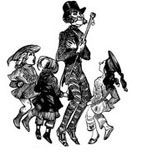
“Grandpa! Grandpa!”
JUST A HUMAN WEED?
When Oregon voters declined to correct the tragic error they had made of legalizing euthanasia, Bernard Cardinal Law observed that “Oregonians will find that what some call a ‘right to die’ easily becomes a ‘duty to die’ once society labels some lives as not worth living.” He is right. Today society is discerning lives not worth living everywhere.
In Barry’s Bay, Ontario, doctors called Harold Cybulski’s family into his hospital room to say goodbye. He had been on life-support systems, but now he was “brain dead and comatose.” It was time to disconnect the machines and let him go. As the grieving family filed in, Cybulski’s two-year-old grandson ran ahead crying, “Grandpa! Grandpa!” Grandpa Cybulski opened his eyes, sat up in bed, and reached down for the little boy.
Grandpa Cybulski’s near-euthanasia experience was not an error, but part of a trend. More and more often “the plug is pulled” on comatose patients, while less and less is the distinction made between patients who are “terminally ill” (in the process of dying from injury or disease) and patients in a “persistent vegetative state” (not dying but with sufficient brain impairment so as to be nearly or totally unresponsive).
In The Facts of Life, Brian Clowes cites studies of persons considered by physicians to be in a “persistent vegetative state.” One study found that 41 percent regained consciousness within six months; 58 percent regained consciousness within three years. Of 370 such patients in another study, one-third recovered and returned to work. Another study of children in long-term comas found that three-quarters of them regained consciousness.
You May Also Enjoy
Our shared vocation as Christians is showing our neighbors that destroying preborn babies cannot be an act of justice, much less of love.
For the sake of your own immortal soul, and for the sake of the lives of the unborn children your ideology menaces, please rid yourself of this delusion.
To avoid problems in Catholic-secular hospital mergers, parties would be wise to specify in writing the actual terms of ethical practice required.

